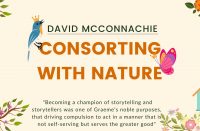Canoeing matters because it can illustrate the mobilization of power and politics through nature, nation, and leisure. The stories told about the canoe, stories related to its iconic status for the nation, need to be understood as moments in the ever-contested field of cultural politics. Thinking critically about the canoe and the stories that made it a national icon can help highlight the significant patterns and features of that field of power. (Erickson, pp. xii-xiii)
Canoeing matters because it can illustrate the mobilization of power and politics through nature, nation, and leisure. The stories told about the canoe, stories related to its iconic status for the nation, need to be understood as moments in the ever-contested field of cultural politics. Thinking critically about the canoe and the stories that made it a national icon can help highlight the significant patterns and features of that field of power. (Erickson, pp. xii-xiii)
Found from art to industry, spanning politics and psychology, the canoe has evolved to become quintessentially Canadian – like no other single object we have woven into our lives and our collective identity.
In Canoe Nation Erickson explores the changing relationship between Canada and the canoe. Through systematic deconstruction, he surveys an impressive array of literature from Bill Mason to Frederick Jackson Turner to Susanna Moodie to illuminate the enigmatic role of the paddlecraft to this country. Fluidly weaving the ideas of others with his own experiences as both a paddler and a researcher, Erickson manages to create an intriguing conversation of not only the craft itself, but also of who we are as Canadians and how we are perceived by the world.
Motivated by his self-described “obsession with […] eruptions of the canoe into the national imagination” [including on sweatshirts, money, U-Haul vans, and restaurants] Erickson was in part drawn to this symbol as a reminder of his own enjoyment of canoeing. I was drawn to review this book for similar reasons and agree that the mythological establishment of the intimacy of the canoe as the character of Canada is one of the primary discourses of the canoe as a national icon.
What I didn’t expect within this text was the tightly-woven discussion Erickson offers to his readers. Provoking and at times candid, he brings to the forefront sometimes hidden aspects of a Canadian ontopology imbued by expectation and grandeur. While a few parallels drawn between canoes and the development of Canada seem somewhat tenuous, the majority of linkages are well-developed and clear. He suggests that the actors chronicled in the texts he highlights are “simply enhancing an already-existing connection between a future nation and the land from which it was born.” What bonds we forge with such paddlecraft and the related ideals of independence, harmony, and aesthetics into the future will continue to be ascribed to our perceptions of the canoe today – whether accurate or otherwise.
Written with complexity and depth, this book would be an ideal asset to conversations on national identity, the acknowledgement of history, and the connection between people and landscape. It will serve as a launch pad for a tremendous amount of reading and I urge you to keep a notepad close by as you add to your list of “authors to read”. Erickson’s portrayal of the canoe historically through to today offers insight into a great many ways of perceiving people and water, which are inextricably bound within this nation.
Canoe Nation: Nature, Race, and the Making of a Canadian Icon, Bruce Erickson, Vancouver, BC: UBC Press, 2013, 232 pages.
Reviewer Information
Amanda Hooykas is an adjunct faculty member of the Faculty of Environment at the University of Waterloo.













